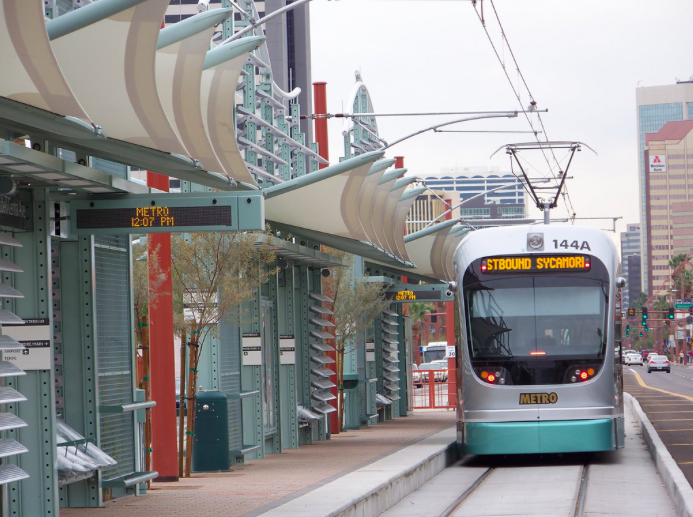The Phoenix City Council is flirting with the idea of killing transit expansion projects, overturning the will of voters who three years ago elected to tax themselves to build transit.
On Wednesday, the City Council voted 5-3 to study diverting billions of dollars set aside for light rail and buses -- and spending it on roads instead.
In 2015, Phoenix residents voted by a 55-45 margin for a transit tax measure to raise $17.5 billion for expanded light rail and bus service. So far, the city has built six miles of light rail at a cost of about $450 million.
Wednesday's vote was not decisive. It only allows the City Council to study diverting the transit funds to road repair. But the result is still ominous: A second vote scheduled for September 19 could actually raid transit funding, according to the Arizona Republic.
These votes are happening against a backdrop of concerted attacks on the city's transit plans.
In June, a last-ditch attempt to kill the six-mile South Central Light Rail extension -- which appeared to be backed by Koch-Brothers affiliated astroturf groups -- was narrowly defeated in City Council. However, two of the City Council members who saved the project have since resigned to run for mayor.
Sean Sweat, an advocate who served on the city's Complete Streets Advisory Board, says there's a power vacuum in Phoenix following the departure of former Mayor Greg Stanton to run for Congress. Stanton was a chief proponent of the 2015 transit measure, known as Prop 104.
In Stanton's absence, anti-transit Council Member Sal DiCiccio has "been taking advantage of it to make more progress on his agenda," said Sweat.
It's not clear where the anti-transit group -- which originally called itself "Four Lanes or No Trains" -- is getting its funding. Noting the similarities to other Koch Brothers campaigns around the country, Congressmember Reuben Gallego and other observers have concluded that the Kochs must be bankrolling it. In June, the New York Times listed Phoenix as one of several cities where the Koch political network is coordinating anti-transit campaigns.
Meanwhile, transit advocates, who successfully promoted Prop 104 in 2015, have not been as unified in defending it, Sweat says.
Throw in the Trump administration withholding federal transit grants (even though Congress continues to appropriate the funds), and the city's light rail plans are in an especially precarious position.
Phoenix's approval of Prop 104 was expected to generate more than $30 billion, including federal funding, split nearly evenly between light rail and increased bus service, with seven percent set aside for walking and biking infrastructure. The city has used it to add to its single light rail route, expanding it from 20 miles to 26 miles.
The next project, the upcoming six-mile South Central extension, is "the most exciting" development, according to Sweat.
"It will create a two-line system for us, and it will put downtown at the nexus of or transit system," he said. "To me that will really change the dynamics in ways that will benefit Phoenix."
Since it has entered the planning phase, that project would not be affected by the City Council's potential highway robbery.
But many billions of dollars for better bus service, expanded light rail, and safer streets for walking and biking remain at risk if the City Council votes to allow those funds to be raided.






